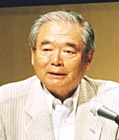 Keynote Proposal 2
Keynote Proposal 2
Globalization of goods, globalization of crises

- Setsuzo Kohsaka
-
- General Partner, Compass Providers L.L.C.
This year marks the one hundredth anniversary of Ford Motor Company. It may safely be said that the mass-production system for the T-Model, and the Standard Oil-led development of the oil industry that underpinned the T-Model production system, have shaped the world in the 20th century. Postwar Japan worked assiduously to catch up with and overtake this American model. Southeast Asian countries, too, have taken off one after the other, like a flock of geese, on the track of progress and development, and clearly indicate that nowadays they have the momentum to catch up with and overtake Japan. Experts compare this development to Central and South America's "import-substituting economy," and call it the success of the "export-driven economy."
China has been pursuing a reform and open-door policy and participating in the Western economy, and the Soviet Union and Eastern Europe too have opened their doors to the world. The world economies are adopting the "export-driven economy" model across the board. We are in the era of globalization. The proliferation of inexpensive products dubbed as the "Uniqlo phenomenon" has accelerated the development of the "one product, one price" economy, but some experts say it has also triggered the over-production phenomenon, and even that the global economy has plunged into an era of deflation. It can be said that the Western economic concepts that used to be the driving force of the global economy under the principle of "progress" have run into the "limit to growth."
On the other hand, the developing countries, which have been left out of these economic trends, need "progress and growth" in order to eradicate poverty, so they are now requesting cooperation from the developed countries. As former World Bank President McNamara so appropriately pointed out, one-third of the passengers on the spaceship called Earth are traveling first class, while the remaining two-thirds are traveling third class. This unbalance makes it difficult to solve various global issues such as terrorism and spread of epidemics, as well as environmental destruction.
It is clearly time for Asia, whose development has been driven not by the principle of "progress" but by the traditional concept of "coexistence with nature," to come up with a new model in order to realize economic development despite the deflation and to solve the globalized crises.






